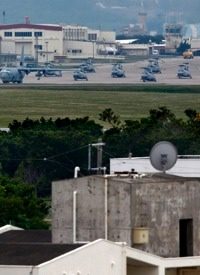
As reported by TheNewAmerican.com several months ago, the United States is presently shifting tens of thousands of military personal and family members from bases in Japan to expanded facilities in the U.S. territory of Guam, with the Japanese government paying over a third of the cost of the relocation. A major reason for the redeployment of these troops is the increased tensions between American service personnel and the surrounding communities in Okinawa.
The latest controversy surrounds the relocation of the Marine Corps Air Station in Futenma. As reported by the New York Times:
That Marine Corps Air Station Futenma must go is not the dispute. U.S. military officials agree the base must be moved. The problem is where.
The United States says that Futenma cannot be shut down until a replacement is elsewere on Okinawa, an idea that most Okinawans oppose. They have the ear of a new left-leaning Japanese government that took office in September and is reassessing the U.S.-Japan alliance….
In Ginowan, the city of 92,000 where the base is located, patience is wearing thin.
The Futenma facility, home to about 2,000 Marines and one of the Marines’ largest facilities in the Pacific, is surrounded by urban sprawl.
The population density outside the base is roughly equivalent to downtown Tokyo. Intense training by helicopters and planes off a 9,186-foot (2,800-meter) runway has prompted residents to dub Futenma “the most dangerous base in the world.”
The base takes up roughly a quarter of the city’s land. Residents must drive around it, causing traffic jams, delays and frustration. Sewer and water lines have been detoured around its perimeter.
“This base violates so many regulations and safety rules that it would be illegal to operate it in the United States,” Yoichi Iha, the mayor of Ginowan, told The Associated Press. “The situation has just been left to fester for too long, and no one has been willing to accept responsibility to do anything.”
He also accused the Marines of regularly ignoring agreements on when and where they can fly. The city is installing a 2 billion yen ($20 million) radar system next year to keep tabs on them. A Japanese court ruled last year the noise levels are unacceptable, and ordered the Japanese government to compensate residents. An appeal is ongoing.
With a 2010 defense budget of $553.8 billion ($663.8 billion when “overseas contingency operations” are included) — approximately seven times larger than the second largest defense budget, that of China — and a federal debt of $12.1 trillion, the question of where to relocate American troops in a nation where they are increasingly unwelcome seems to miss a more fundamental question. As the United States approaches the 65th anniversary of Victory over Japan Day, perhaps a more reasonable question would be: Should our troops come home now?
When Gen. Stanley McChrystal recommended deploying an additional 40,000 American soldiers to Afghanistan, it was estimated that the deployment would cost between $40 billion and $54 billion a year. Such an additional expense exceeds the entire defense budget of many of the most powerful nations in the world. In point of fact, the U.S. defense budget greatly exceeds the combined similar expenditures of China, France, the United Kingdom, Russia, Germany, Japan, Italy, Saudi Arabia and India — the second through tenth largest budgets in the world — combined. With approximately 47,000 troops in Japan six and a half decades after the conclusion of the Second World War, the cost of such a deployment, and the implications for souring relations with that nation, are considerations which cannot be ignored.
Photo of U.S. Marine Corps Air Station in Okinawa: AP Images



